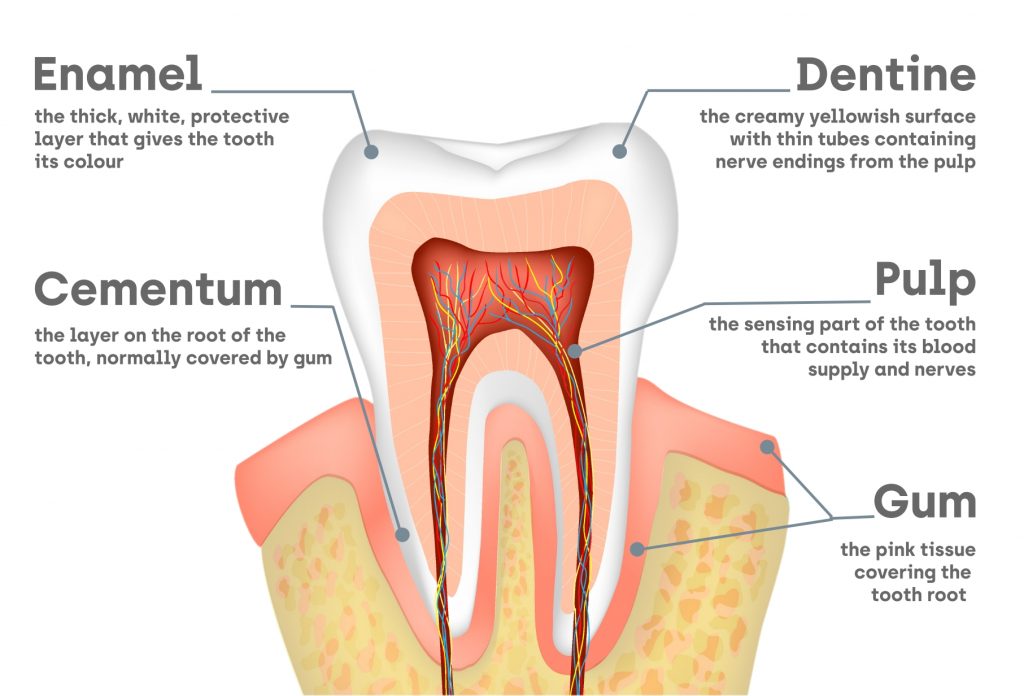
Tooth sensitivity, also known as dentin hypersensitivity, occurs when the inner layer of the tooth (dentin) becomes exposed or irritated, leading to discomfort or pain when the teeth come into contact with certain stimuli, such as cold, hot, sweet, or acidic foods and drinks. Here’s a detailed look at the causes of tooth sensitivity and some simple, fast ways to alleviate it.
Causes of Tooth Sensitivity
- Enamel Erosion:
- Acidic Foods and Drinks: Consuming a diet high in acidic foods (like citrus fruits) and beverages (like soda, energy drinks, and wine) can erode tooth enamel over time, exposing the sensitive dentin beneath.
- Aggressive Brushing: Brushing too hard or using a toothbrush with hard bristles can wear down the enamel, leading to sensitivity.
- Bruxism (Teeth Grinding): Grinding or clenching your teeth, often during sleep, can wear away the enamel and expose the dentin.
- Gum Recession:
- Periodontal Disease: Gum disease can cause the gums to recede, exposing the roots of the teeth, which are not covered by enamel and are more sensitive to external stimuli.
- Aggressive Brushing: Like enamel erosion, brushing too hard can also cause the gums to recede, leading to sensitivity in the exposed tooth roots.
- Tooth Decay:
- Cavities: Tooth decay that progresses through the enamel to the dentin can cause sensitivity, especially when exposed to heat, cold, or sugary foods.
- Leaky Fillings or Crowns: If a dental filling or crown becomes loose or worn out, it can expose the underlying dentin, leading to sensitivity.
- Dental Procedures:
- Teeth Whitening: Whitening treatments, especially those done at home, can sometimes cause temporary sensitivity.
- Dental Cleanings and Procedures: Dental cleanings, fillings, or other restorative procedures can sometimes lead to temporary sensitivity as the teeth recover.
- Exposed Dentin:
- Cracked Teeth: A crack in the tooth can expose the dentin, leading to sensitivity.
- Exposed Tooth Roots: As mentioned earlier, gum recession can expose the roots of the teeth, which are more sensitive.
Simple and Fast Ways to Cure Tooth Sensitivity

- Use Desensitizing Toothpaste:
- How It Works: Desensitizing toothpaste contains compounds that help block the transmission of pain signals from the tooth surface to the nerve. Potassium nitrate and stannous fluoride are common active ingredients.
- How to Use: Brush with desensitizing toothpaste twice a day. For quicker relief, you can apply a small amount directly to the sensitive teeth and leave it on overnight.
- Switch to a Soft-Bristled Toothbrush:
- How It Helps: A soft-bristled toothbrush is gentler on both enamel and gums, reducing the risk of further damage that can lead to sensitivity.
- How to Use: Use gentle, circular motions when brushing, avoiding aggressive back-and-forth scrubbing.
- Avoid Acidic Foods and Drinks:
- How It Helps: Reducing intake of acidic foods and drinks can prevent further enamel erosion, helping to protect against sensitivity.
- How to Implement: Limit acidic foods like citrus fruits, tomatoes, vinegar, and beverages like soda and wine. After consuming them, rinse your mouth with water to neutralize acids.
- Fluoride Treatments:
- How It Works: Fluoride helps strengthen tooth enamel, making it more resistant to acid attacks and reducing sensitivity.
- How to Use: You can use a fluoride mouthwash daily or ask your dentist about in-office fluoride treatments.
- Saltwater Rinse:
- How It Helps: Saltwater is a natural antiseptic and can help reduce inflammation in the mouth, which may be contributing to sensitivity.
- How to Use: Dissolve half a teaspoon of salt in a cup of warm water and swish it around your mouth for 30 seconds. Spit it out and rinse with plain water afterward. Do this twice a day.
- Avoid Whitening Toothpaste or Treatments:
- How It Helps: Whitening agents can sometimes increase sensitivity. Switching to a non-whitening toothpaste can help alleviate symptoms.
- How to Implement: Opt for toothpaste that is specifically formulated for sensitive teeth and avoid home whitening kits.
- Use a Mouth guard for Bruxism:
- How It Helps: If you grind your teeth at night, wearing a custom-fitted mouth guard can protect your enamel from wear and reduce sensitivity.
- How to Implement: Consult your dentist for a custom mouth guard or use an over-the-counter option as a temporary solution.
- Proper Oral Hygiene:
- How It Helps: Keeping your teeth and gums healthy through proper brushing, flossing, and regular dental check-ups can prevent many of the causes of sensitivity.
- How to Implement: Brush twice a day with a fluoride toothpaste, floss daily, and visit your dentist every six months.
- Avoid Extreme Temperatures:
- How It Helps: Sensitivity is often triggered by very hot or cold foods and drinks. Avoiding these can help prevent discomfort.
- How to Implement: Let hot foods and drinks cool down and avoid consuming extremely cold items directly.
When to See a Dentist

- If the sensitivity persists despite using home treatments.
- If the sensitivity is severe or accompanied by other symptoms like pain, swelling, or bleeding gums.
- If you suspect a cavity, cracked tooth, or gum disease.
patientlifematters.com: Your dentist may recommend treatments such as fluoride varnishes, bonding agents, or even a root canal in severe cases.
Very good write ups Thanks!
casino en ligne
You said it very well..
casino en ligne
Thanks a lot. Quite a lot of data!
casino en ligne
With thanks. Plenty of knowledge!
casino en ligne
Kudos. I value this.
casino en ligne France
Truly plenty of great info!
casino en ligne
Good posts, Kudos.
casino en ligne France
You actually mentioned it perfectly!
casino en ligne
Amazing tons of excellent info!
casino en ligne
Thank you. Plenty of info!
meilleur casino en ligne